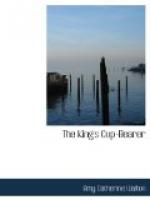Nehemiah’s earnest words prevailed,
‘Then said they, We will restore them.’
This promise was followed by a very curious act on the part of Nehemiah.
‘I shook my lap.’
The lap is what the Latins called the sinus, a fold in the bosom of the tunic, which was used as a pocket. Eastern-like, Nehemiah used a sign to show what will happen to any man who shall break the promise he had just made. God will cast him forth as a homeless wanderer, emptied of all his possessions, all his ill-gotten wealth. He shall be void or empty, just as Nehemiah’s pocket was void or empty, ver. 13.
‘And all the congregation said, Amen.’
Then, instead of the great cry of distress, was heard the great shout of joy, for
They ‘praised the Lord.’
And the promise was not one of those promises made to be broken, for
‘The people did according to this promise.’
It has been well said that Christians are the only Bible that men of the world read. In other words, those who will not read the Bible themselves, judge the religion of Christ simply by the Christians they happen to come across. This is not a fair way of judging; it surely cannot be right to condemn Christianity itself, because some of those who profess it are not what they ought to be.
Let us picture to ourselves an island in the Pacific Ocean, where no European has ever been seen. A large ship is wrecked not far from this island, and three men are able to make their escape in a boat, and to land upon its shore. The men belong to three different nations—one is a Frenchman, another is a German, and the third is an Englishman. The people of the island receive them most kindly, warm them, and feed them, and shelter them, and do all they can for them till a ship shall come to take them away.
What return do the three men make for their kindness? The Frenchman is grateful, and willing to make himself useful in any way he can: he amuses the children and helps in the work of the house, and does all he can to make return for the hospitality he is receiving. The German is very clever with his fingers, and spends his time in teaching the natives to make many things which they had not been able to do before; he becomes indeed so helpful to them that they dread the day coming when he will have to leave them. But the Englishman is a man of low tastes and bad morals. He spends his time in drinking the spirit he finds on the island, in quarrelling with the inhabitants, and in ill-treating their children; there is not a soul on the island who does not rejoice when the ship bears him away, never to return.
Soon after this, news is brought that a small colony from Europe is anxious to settle on that island, and to trade with the inhabitants. The commercial advantages of this step are laid before the natives, and leave is asked for the party of traders to land. One question, and one question only, is asked by the inhabitants. Of what nation are these colonists? The answer is brought back, They are English. At once the whole island is up in arms. They shall not land, they cry, we will not hear of it; we know what English people are, we have had plenty of the English. Had they been French or Germans we would have given them a hearty welcome, but we never wish to see an Englishman again.




